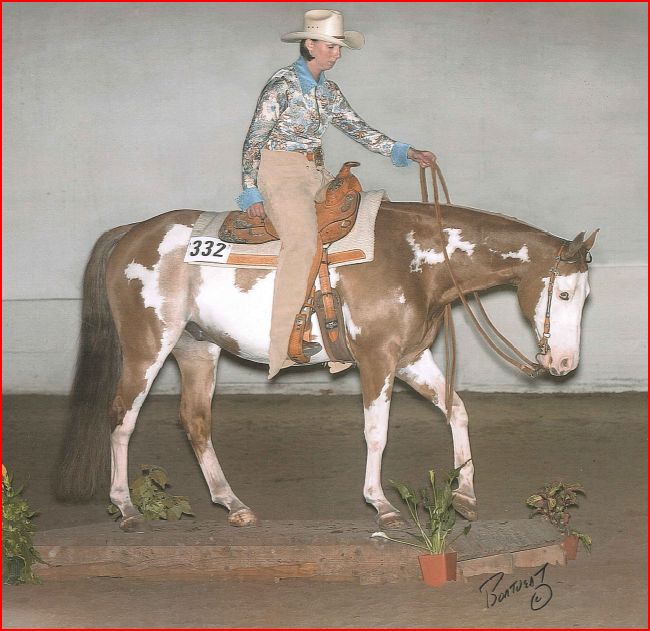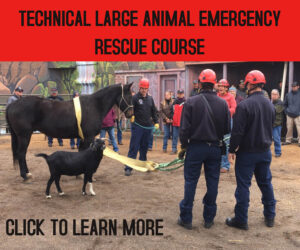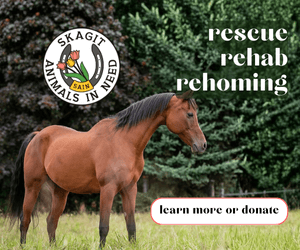3 Factors to Improve Your Horse’s “Golden Years”
by Jackie Davenport
In the past months I’ve talked about how indoor or “arena trail” work can benefit both horse and rider and it is a discipline that many horses and their riders can continue doing very successfully as they age together. Among the issues that come to mind when I think about working with older trail horses include the horse’s interest, soundness and fitness. Let’s take a look at each of these.
By the very nature of arena trail it’s generally easy to keep a horse interested. Due to an infinite variety of courses I find that many advanced trail horses will focus on poles and “own” them, knowing what to do, wanting to do it and even appearing to enjoy the challenge. I take great care to vary the work, though, and never over ride my aged trail horses. I take care not to over work any obstacle and add in periodic rides where I work trail maneuvers, but without using any poles. I’ll work an imaginary gate or serpentine imaginary cones; I’ll back a circle or square and do a walk-over down the middle of the arena. Mix it up for your older horse and remember to always end the ride with your horse wanting to do more.

Fitness is also a primary concern. I don’t like to work my advanced trail horses daily, but I keep them in a routine that ensures they remain fit and supple. I’ll typically work them three days a week so they retain muscle, but with turnout in between so they also remain fresh. I always do some collected work as well with an emphasis on good transitions and proper striding and I’ll spend part of each ride on walk-overs, back-throughs, side-passes and other slow work because it can really help an older horse to keep their condition. As trail horses age, some start to “tick” poles rather than elevating and going over the poles cleanly. When I’ve made sure the issue isn’t related to soundness, I’ll often raise my poles to remind a horse to pick up its feet. I’ll also vary the width of my poles, moving them to the maximum and minimums of the spread standards (see October issue for the “standards” chart) to encourage them to lengthen and shorten their stride. I’ll always take extra care to make sure the obstacle is generally doable for the abilities of the senior trail horse.
When I consider the fitness of an older trail horse I also focus on maintaining their suppleness and stamina. Trail horses do not need to be as fit as, say, a reining horse or working hunter but working over poles can still be tiring. I am a big believer in keeping all my horses supple so I start every ride with suppling exercises. These include bending and trotting circles, reverse arcs and leg yields. These can all help keep your older horse supple.
I find that transitioning between loping and trotting circles of various sizes and count (e.g. three loping, two trotting, four loping, six trotting etc.) is a great exercise to maintain an older horse’s stamina. If you have access to a hill that’s safe to ride on a great exercise for helping an older horse’s stamina is walking down, then walking or jogging back up the hill. This also really helps keep the horse’s hip, back, neck and other muscles toned – not to mention it gets them out of the barn so is great for their minds, too!
And, finally, if your horse isn’t moving well you can’t do an obstacle well. Some older trail horses can benefit from extra attention to their backs, necks and joints to ease the aches and pains we all face as we age. It’s important to work with your veterinarian and farrier to coordinate this extra care as well as be prepared to keep up with any recommendations. I’m personally a big believer in joint health as I’ve found it’s more cost effective to maintain horses as they age rather than try to rehabilitate them after sporadic or non-existent care. Older horses that have been neglected are much harder to bring back to working condition than young or even middle aged horses.
I hope this article has given you some ideas on how to manage your arena trail horse as he/ she ages. The experience of an aged partner is precious and with good care you can expect to have many happy years of riding or showing together.
Published in December 2015 Issue

The Northwest Horse Source is an independently owned and operated print and online magazine for horse owners and enthusiasts of all breeds and disciplines in the Pacific Northwest. Our contemporary editorial columns are predominantly written by experts in the region, covering the care, training, keeping and enjoyment of horses, with an eye to the specific concerns in our region.







